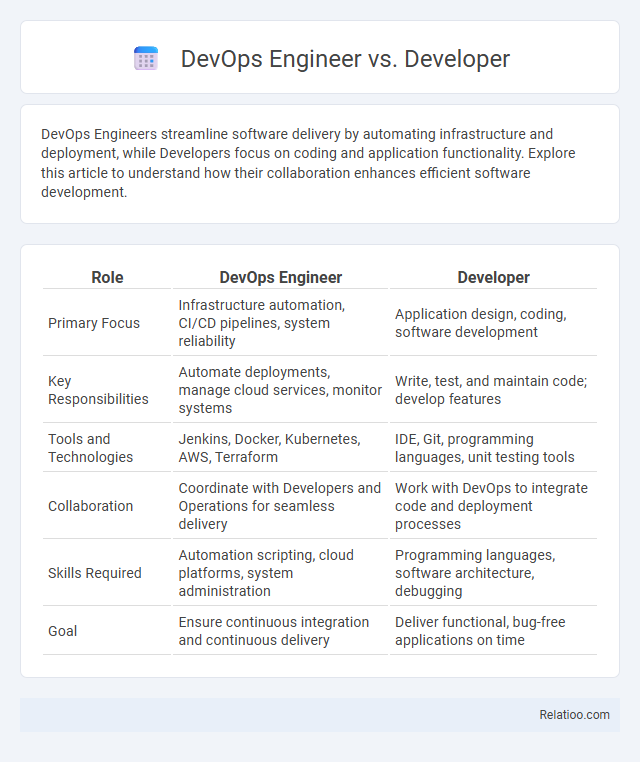DevOps Engineers streamline software delivery by automating infrastructure and deployment, while Developers focus on coding and application functionality. Explore this article to understand how their collaboration enhances efficient software development.
Table of Comparison
| Role | DevOps Engineer | Developer |
|---|---|---|
| Primary Focus | Infrastructure automation, CI/CD pipelines, system reliability | Application design, coding, software development |
| Key Responsibilities | Automate deployments, manage cloud services, monitor systems | Write, test, and maintain code; develop features |
| Tools and Technologies | Jenkins, Docker, Kubernetes, AWS, Terraform | IDE, Git, programming languages, unit testing tools |
| Collaboration | Coordinate with Developers and Operations for seamless delivery | Work with DevOps to integrate code and deployment processes |
| Skills Required | Automation scripting, cloud platforms, system administration | Programming languages, software architecture, debugging |
| Goal | Ensure continuous integration and continuous delivery | Deliver functional, bug-free applications on time |
Introduction to DevOps Engineer and Developer Roles
A DevOps Engineer bridges development and IT operations by automating workflows, managing CI/CD pipelines, and ensuring system reliability, while a Developer primarily focuses on writing, testing, and maintaining code to build software applications. DevOps Engineers utilize tools like Jenkins, Docker, and Kubernetes to streamline deployment and improve collaboration across teams, contrasting with Developers who typically work with programming languages such as Java, Python, or JavaScript to create application features. Understanding these distinctions clarifies how DevOps fosters continuous integration and delivery alongside the development lifecycle.
Key Responsibilities of a DevOps Engineer
A DevOps Engineer primarily focuses on automating software development and IT operations to enhance deployment speed, system reliability, and scalability. Your key responsibilities include building and maintaining CI/CD pipelines, managing infrastructure as code, and monitoring system performance to ensure rapid, seamless releases. Unlike developers who write and test code, DevOps Engineers bridge the gap between development and operations teams, optimizing workflows and minimizing downtime.
Core Duties of a Developer
A Developer primarily focuses on writing, testing, and maintaining code to build functional software applications, utilizing programming languages such as Java, Python, or JavaScript. Core duties include translating business requirements into technical solutions, debugging code, and collaborating with cross-functional teams to ensure feature completeness and software quality. Unlike DevOps Engineers who manage deployment pipelines and infrastructure automation, Developers concentrate on the creative and logical aspects of software development.
Skills Required for DevOps Engineers
DevOps Engineers require a unique blend of skills including proficiency in continuous integration and continuous deployment (CI/CD) pipelines, cloud platforms like AWS or Azure, and infrastructure as code tools such as Terraform or Ansible. Unlike Developers who focus mainly on coding and application development, DevOps professionals must master automation, scripting languages like Python or Bash, and system monitoring to streamline software delivery and improve reliability. Your ability to collaborate across development and operations teams, combined with strong problem-solving skills, distinguishes a successful DevOps Engineer.
Essential Skills for Developers
Essential skills for developers include proficiency in programming languages such as JavaScript, Python, or Java, strong problem-solving abilities, and familiarity with version control systems like Git. Developers also need a solid understanding of software development methodologies, including Agile and Scrum, to effectively collaborate within teams and deliver high-quality code. Core competencies in debugging, testing, and writing clean, maintainable code distinguish effective developers from DevOps engineers, whose focus lies more on automation, continuous integration, and infrastructure management.
Tools and Technologies: DevOps vs Developer
DevOps engineers utilize tools such as Jenkins, Docker, Kubernetes, Ansible, and Terraform to automate deployment, manage infrastructure, and ensure continuous integration and delivery, while developers primarily focus on integrated development environments (IDEs) like Visual Studio, IntelliJ IDEA, and code repositories like Git for software creation. DevOps emphasizes infrastructure as code, container orchestration, and monitoring tools like Prometheus and Grafana, contrasting with developers who prioritize programming languages including Java, Python, and JavaScript for application development. The distinction centers on DevOps' commitment to pipeline automation and system reliability, whereas developers concentrate on coding, debugging, and feature implementation.
Collaboration and Workflow Differences
DevOps Engineers prioritize seamless collaboration between development and operations teams, enhancing continuous integration and continuous delivery (CI/CD) workflows to automate and streamline deployment processes. Developers focus on writing and testing code, concentrating on feature development and debugging within version control systems like Git. Your team benefits from the DevOps Engineer's management of infrastructure and monitoring tools, ensuring faster releases and more reliable software delivery compared to traditional developer roles.
Career Paths and Growth Opportunities
DevOps Engineers focus on automating processes, integrating development and operations to enhance deployment speed and reliability, offering career growth through specialization in cloud platforms, CI/CD pipelines, and infrastructure as code. Developers concentrate on writing, testing, and maintaining code, with career advancement tied to expertise in programming languages, software architecture, and project management. While Developers often transition into roles like Senior Developer or Software Architect, DevOps Engineers can progress towards roles such as Site Reliability Engineer or DevOps Manager, highlighting distinct yet complementary career trajectories in the tech industry.
Salary Comparison: DevOps Engineer vs Developer
DevOps Engineers typically command higher salaries than Developers due to their expertise in automation, cloud infrastructure, and continuous integration/continuous deployment (CI/CD) pipelines, with average salaries ranging from $100,000 to $140,000 annually in the US. Developers, specializing primarily in coding and software design, earn between $80,000 and $120,000 depending on their programming skills and experience. The demand for DevOps skills continues to grow as companies prioritize faster, more reliable software delivery processes, which directly influences the salary premium in comparison to traditional developer roles.
Which Role Is Right for You?
A DevOps Engineer specializes in automating software deployment, infrastructure management, and continuous integration/continuous delivery (CI/CD) pipelines, ideal for those who enjoy combining coding with system operations. Developers focus primarily on writing, testing, and maintaining code to build applications, suitable for individuals passionate about problem-solving and software design. Choosing between these roles depends on whether you prefer working on software creation and design (Developer) or on streamlining deployment processes and infrastructure automation (DevOps Engineer).

Infographic: DevOps Engineer vs Developer
 relatioo.com
relatioo.com